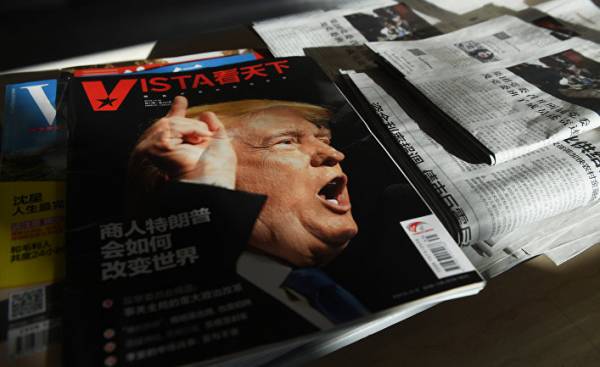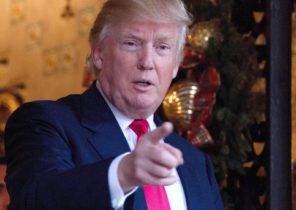
In the period, which can be called the era of “increased globalization” (1992-2008), the world increasingly became similar to a universal free market, where there were a representative democracy, and countries combined in regional blocks.
If you have set these goals, today we are further than ever from achieving them than 20 years ago. Industrial policy — and not only in countries such as Brazil, Russia, India and China, but in Europe and the United States began to restrict the “export of jobs” and focused more on local production.
What philosopher and political scientist Francis Fukuyama called the “end of history”, or what we could classify as “superiority of the West” may not have ended, but is already under attack.
Brakcet and Donald trump is a relatively recent phenomenon in the political landscape, however, the risk of de-globalization has been increasing since 2008.
Trump violates the historical tradition, according to which the world’s largest economy usually acts as the most powerful defender of free trade. Starting with Harry Truman (1945-1953) and ending with Barack Obama (2009-2017), there has never been an American President who is not defending trade liberalization.
The first consequence of this rollback was out of the TPP (TRANS-Pacific partnership) Treaty, which it was not only about tariffs and quotas, but also about the rules and regulations governing such areas as labor laws, environmental protection, intellectual property and government procurement. Don’t forget about the “geglobaliseerde” industrial policy.
When General Motors will not be able to leave the United States to build a factory in India, it will be reversing the global chains of production and the efficiency, which provided the logic of global supply chains. This is the main element of the notorious “de-globalization”.
In this context, the probability of trade war is increasing in a most unpleasant way. If the two largest global economies — US and China — will come together in a pointless argument, it is reasonable to assume that the logic of escalation, familiar to us since the cold war, can be repeated in the sphere of trade through the introduction of penalty rates and other methods of settling accounts.
This is a dangerous scenario, and the Americans run the risk of losing in this game no less than the Chinese and the rest of the world.
Some put forward the thesis that a trade war hardly will seriously affect Brazil, is nonsense. Where is the main flow of Brazilian exports? In China.
If the Americans imposed unilateral barriers or some other commercial litigation reduced the growth prospects of the Chinese economy, it will affect the price of Brazilian commodities, and then, probably, will lead to a decrease in orders.
Those who believe in a less globalized world Brazil nothing special danger, basing their argument on the fact that our economy is already fairly closed, and the potential size of the consumer market is impressive.
But China’s domestic market is much higher than ours, meanwhile, the “Chinese miracle” — the most ambitious in the history of mankind the liberation of people from poverty — was achieved as a result of globalization, where export and international trade were the main engines. Not the domestic market.
Moreover, theoretically, a powerful domestic market in the closed economy case is possible only if the giant growth of labor productivity and capital — something that in Brazil we do not observe.
The productivity growth we have extremely low compared to other countries. Therefore, this logic does not work here. It serves as a kind of “strategic justification” for those who have not concluded an international agreement. If any agreement like the TPP, go to the bottom, someone will say, “see? And to go there not worth it.”
I prefer to bet that de-globalization will last less than we think. It’s true that trump in the hands of a good card. The unemployment rate in the U.S. is low, between four and-a-half and five percent. American economic growth is not impressive, but at the moment, by OECD standards, it is acceptable.
That is, the wave that rides a trump, much better than those that have been Obama or Bush. No banking crisis in 2008 or the sovereign debt crisis, as in 2011. And in the short term, the stock market positively reacts to the news about the tax breaks.
If trump will handle the comprehensive promotion of infrastructure, it will also be a source of short-term investments, which play an important role. Even protectionism, prohibiting American companies to leave the United States, in the short term save jobs and will have a positive effect, especially from the point of view of consumption.
Then what is the problem? Why the period of de-globalization, is likely to be less long than we expect? The United States still being the main actor in the field of trade, will lose its export potential, its effectiveness; abolished the benefits associated with global supply chain. For all this, America will have to pay a high price. As a result, the cycle of de-globalization will be reduced.
In the not so distant future will start to decrease the indicators of corporate income. Will become more apparent the costs of protectionism, local production and industrial policy based on import substitution.
If trading partners of the United States decides to pay them the same coin — and this scenario is quite likely — it will also negatively affect the overall performance of American companies.
Suppose you are the Director for strategic planning of Toyota and is considering construction of a plant for production of engines in Monterrey, Mexico.
Since you don’t know what will happen with NAFTA, then decide to withhold investment. This does not mean that the plant will be built in Kansas city. Investment may simply not be. Procrastination is worse than panic.
And this braking action can cause the American economy irreparable harm, slowing the flow of foreign direct investment. And let’s not forget that even the Chinese capital, the main direction of direct investment is the United States.
This means that in the case of strong commercial tensions affected not only the exchange of goods but also the movement of investment. All of this in the medium term will have a negative impact on the presidency trump. That’s why the costs of deglobalization faster than we think, will lead the world to re-globalisation.







